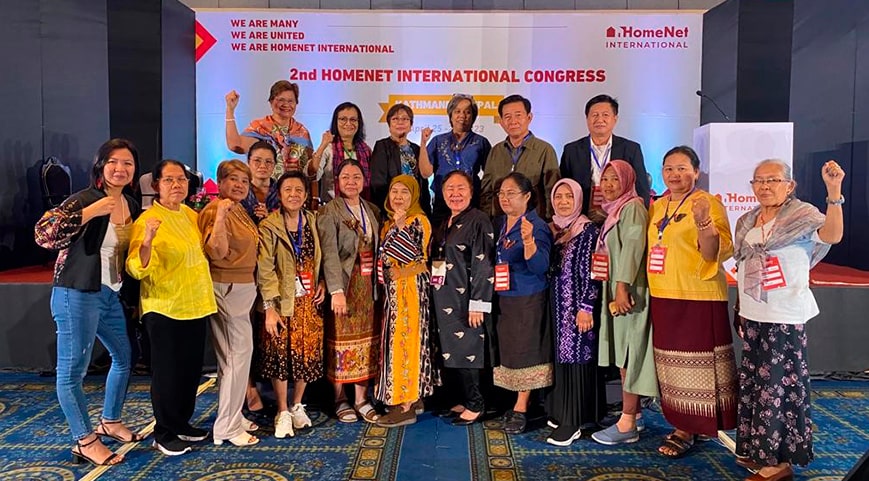“The Declaration issued was very useful for us to bring to our country as one of the references when we advocate to the Government, both at the national level and regional levels in the context of changing the conditions of homeworkers towards the better.
The opening of the Congress was very interesting, with all participants given the opportunity to appear carrying flags. They were introduced in a very interesting way by the Chair, so that all participants could know and recognize who was coming and from which country.
The bazaar of products for homeworkers from various countries held during the Congress provided homeworkers with an opportunity to display their product creations, earn income, and at the same time buy and exchange products with homeworkers from other countries. The products from every country became easy to recognize and promote. Fashion products on display were also very interesting and rarely found in other events.”Titin Kustini, HomeNet Indonesia
“Every day, there were traditions and cultural dance shows performed by participating countries. The performance was indicated and associated with cultural traditions, community, and identity. Dance performances, to me, reflected the values and beliefs of a particular group of people and I see them as a way to preserve and celebrate national culture. Additionally, I also see the dance performance as a way to bring people together, fostering social connections and community building, the inclusion of community expression, cultural preservation, and creative expression.
Also, I realised that the election process for office-bearers was in a democratic manner and women are promoted to assume the responsibility and play an important role in the committee. Most importantly, the position holders expressed their feeling and commitment to serve the committee and office.
The exposure visit showcased a good model of reorganising the home-based workers(HBWs) after the earthquake through making different types of handicraft products and sales at the local markets and to walk-in customers. The community has tried to establish kindergartens for the children of HBWs with an affordable monthly fee. The kindergarten seems well organised, with clean and good sanitation. It looks like the parents of those children are satisfied with the services provided by the kindergarten.”Sinoeun Men. Cambodia Home-Based Workers Association (CHWA)
“I learned the diverse organising experiences of home-based workers like cooperatives - how common problems are overcome, the building of welfare programs and activities to help one another, the marketing of HBW products and reducing the role of middlemen and subcontractors in the supply chain. An important lesson is networking and collaboration with government agencies.”
Nuchnapha Bamrungna, President of HomeNet Thailand
“I learned from what participants shared around organising, how women informal workers organise membership-based organisations (MBOs) around their needs and problems, including gender discrimination. I realised the power of organising and networking, bargaining and negotiation both at the community and national level. I was also impressed with the diversity of culture and identity expressed through costumes and crafts.”
Kotchaporn Klakthongkham, Vice President of HomeNet Thailand
“I was very happy to have a chance to join the HNI Congress, to meet and exchange with representatives of home-based workers all over the world. It was a very big, important and powerful gathering strengthening solidarity. I love how the cultural exchange was organised. I also admire the field trip to visit Nepali home-based worker homes and to learn about their livelihood activities for improving their quality of life and aiming to access their rights and create just society.”
Lamphan Nanthapanya, President of IWAA - HomeNet Lao
“It was in the 2nd HNI Congress that I learned the history of HBWs, SEWA, HNI. This is my first time in Kathmandu, Nepal and I am very impressed with the Nepali culture. I am very happy to have visited and learned from families in the villages. I am overjoyed to have seen the products of HomeNet from many countries. I also learned from the sharing of experiences on access to markets in other countries.
Khanthone Phamuang, Director of ECCDA, HomeNet Lao
“At the HNI Congress I learned:
- how to create organised groups with rules and division of responsibilities,
- vocational training for members and villagers’ communities, taking raw materials from nature and transforming them into various items
- a nursing room for health checks for members and the community
- group savings, to help members within the group
- welfare assistance for members and access to social security
- a children's centre - a place for kindergarten children in the 1st-3rd year
- yearly exchange of experiences and study tours
- exhibition of products at the domestic market, in the local section, as well as advertising through Facebook to bring the products to the international market.”
Bounsum Siphonesay, President of ECCDA, HomeNet Lao
“Organising and solidarity are most likely the secrets to HNI growth. For HNI to continue its growth, formation-training on the national and regional HomeNets has to be sustained. I felt the spirit of social solidarity reverberating in the Congress hall. It was very inspiring. Long live women!”
Rebecca Biasbas, Chairperson Organizing Committee, of Homenet Philippines
“Differences in gov't laws and interventions are not barriers to HNI to organise and unite the marginalised and successful groups of HBWs.
The struggling HBWs groups and the successful cooperatives of SEWA are very inspiring. It is not impossible to achieve our aspirations with continuous organising. Lobbying and advocacy are great tools to be heard. With a united direction and since we are many we can realise whatever we are striving for.”Evelyn Buluran-Cruz of PATAMABA



